11. Anything you are particularly excited about in brewing right now? Maybe a new hop or technique? I see you are using the new Cryo Hops.
Yea, we did an experiment using Cryo Hops in West Coast IPA. They are billed as more efficient, and I think we’ve seen it. The whirlpool here is designed to help us separate the solids from the wort before we pass it on. … Getting that trub and hops to settle out as much as possible means more beer. Our whirlpool is big for a 50-bbl system because if we brew imperial ipa or West Coast — it’s a lot of hops — which makes a huge trub pile. With Cryo hops you don’t have the leaf and stem, just good hoppy business, in theory that means less of the wort is bound up with hops and trub and more hits the fermenter. We’ve seen that to a small extent so far, but it also had a different flavor profile. And we’re not necessarily interested in changing the flavor of our beer to be more efficient. It was an experiment and it was delicious, but it wasn’t a West Coast IPA.
Other ingredients that we’re excited about … we try a lot of hops out. Two new hops we really like are Idaho 7 and Comet. Comet is an older variety that’s been kind of rediscovered. Idaho 7, from Idaho and parts of Oregon, has a nice fruitiness and a pungent dank combination.
12. Where have you used it so far?
Just in some experimental batches. When you are a big brewery like this you … have to meter your releases. With Comet, we did a test batch, release in California, the Comet hopper — a pale ale brewed with wheat and comet hops. Nice, not super bitter but pretty hoppy. Hop bursted basically.
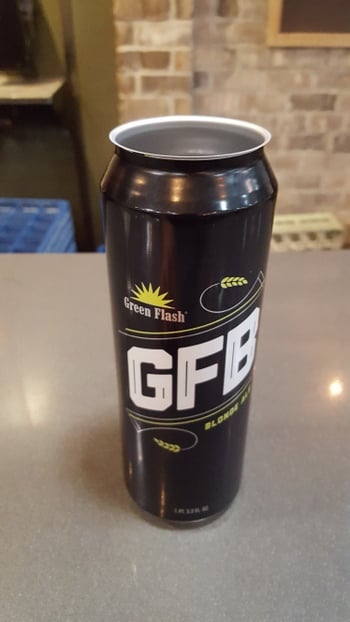
13. Have you noticed any buying trends that have maybe changed what you are doing?
Yes, to an extent. IPA is still king but last year we saw people drinking a lot of sour beers — goses, Berliner Weisse … we’re not really equipped to brew those beers. We’ve done some pilot batches but nothing production scale. GFB is a market response. We see that blonde ale is killing it so we’re bringing this out to satisfy that market.
As far as the next cool thing? I am hoping you are going to tell me that. I’m an old guy. I don’t get out to the bars. I have kids. I’m not out there trying to find the new beers.
Although I did just have a tropical hefeweizen from Groundswell Brewing that was super hoppy, and it was freaking delicious. That idea had been on our mind, and I was like ‘I don’t think anyone is doing that.’ So we already had the recipe. We just hadn’t done it yet. So, we just brewed our own hoppy hef, and it’s freaking awesome.
14. Any hops you are against?
[Ponders for 10 seconds] Nah, I pretty much like all hops. There’s been a backlash against Amarillo because they were so good for so long, but the quality is maybe not as good in recent years. And the grower who controls the genetics was not writing contracts for a while and then would offer a contract for ridiculous sums of money, and you just get bitter — I was using this back when it was $7 a pound, what’s changed? Plus, they were better then. So, if there’s any bitterness, it’s there, but we still use them. We do whatever we can to find alternates.
15. With so much competition out there, are you seeing any shifts in your sales? Such as your core beers not selling like they used to in favor of new releases?
There’s sort of diminishing returns in just putting out new beer after new beer. Yes, it can be successful because people always like new shiny things, but beers like West Coast IPA and Duet, they have a stable sales base. But for us to put out a bunch of new beers like that is hard on our distributors because if we just keep saying ‘hey, we have a great idea,’ they don’t always appreciate it as much as you’d think because what if it doesn’t sell? Crap, I have 300 cases sitting in my warehouse, and now I have to eat it.
The seasonal thing has waned a little bit in the last couple years. We tend to do less and less special release in bottles and more and more on draft. And I think you’ll see more of that — more special release draft offerings because that gets us into the bar and people drink it at the bar and maybe like it and, it inspires them to buy our beer.
16. We ran a feature last week about how breweries stay relevant over so many years. Do you have any advice on that topic?
It’s definitely a concern for us, I think the biggest thing is to keep using the pilot system and keep brewing beers – even if it’s not big releases … We all know what we like, which is the most important thing. If not every person in the brewery is a total dork homebrewer weirdo, then it’s 95 percent. So we all love beer and are super passionate about it. None of us got into this industry to get rich. We just do it because it’s freaking cool, and we’re passionate about it, so we want to brew things we’re passionate about and good quality. That’s the best way to stay relevant, I think. Be real about it and brew things you like.
17. What’s your favorite random piece of equipment in the brewhouse that has changed your life.
The hop funnel — or better yet — the hop elevator. Let’s go look at it. … It’s really not that exciting.
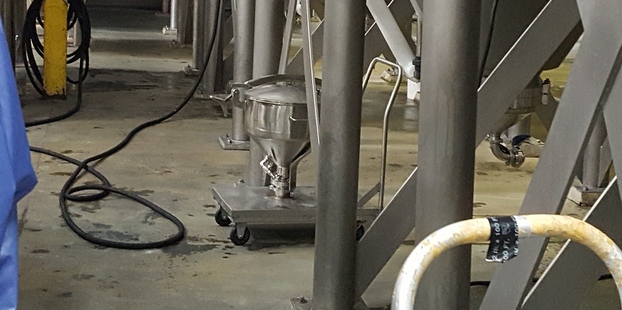
The hop funnel holds a 44-pound bag of hops, sized perfectly for that. You can open it up, throw the bag in there and fits perfectly. But how the hell do you get those boxes of hops up to the top of the tank?
Our beers are hop forward. If we dry hop, it’s about a half a pound to 2 pounds of hops per barrel. So, with 250-bbl fermentation, we could have 500 pounds of hops to put in there. Eleven to 12 boxes. Plus the hop funnel.
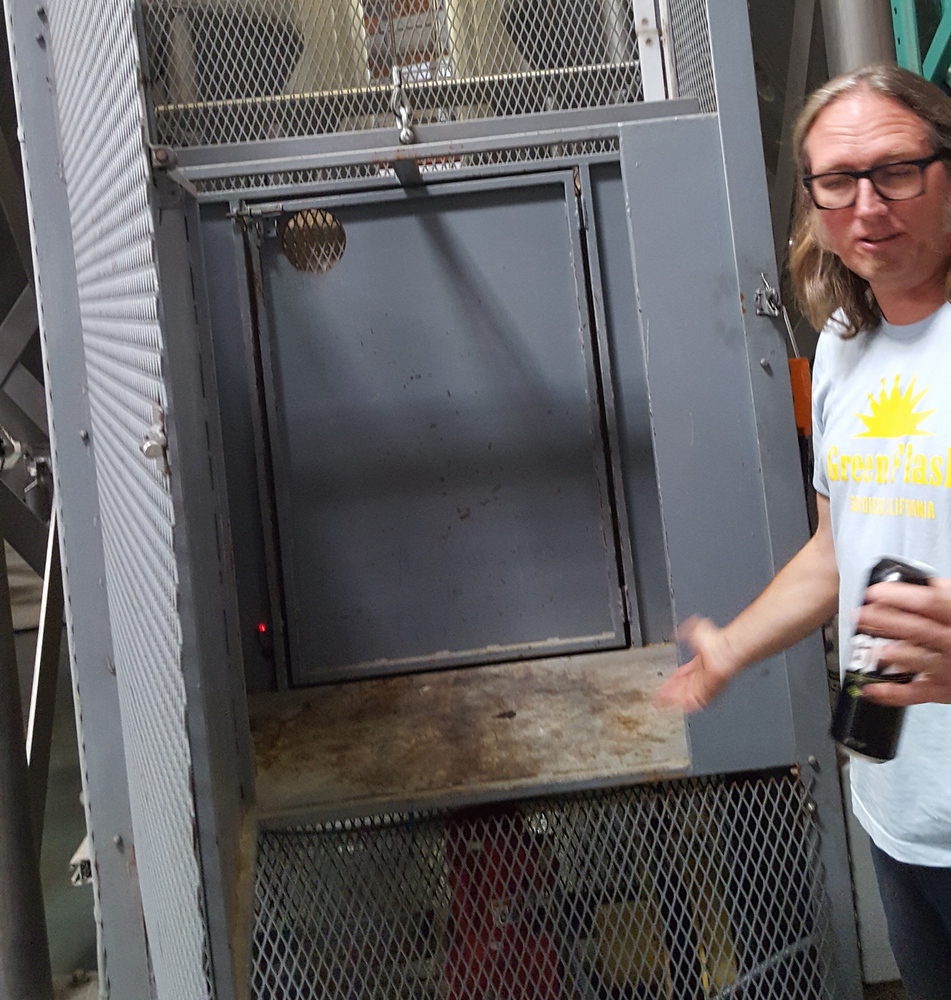
Before, you would have to climb up there on a ladder with a bucket of hops and a funnel and you could die. I used to have to do that. Like if I saw someone doing that here, I would freak out because it’s not safe. What are you, fucking crazy? But a lot of other brewers still get on that ladder and risk their safety.
18. Do you have any thoughts on Big Beer buying up craft brewers? Does that concern you?
Yes, I think it should be a concern of everybody. I think it’s anti-competitive, quite honestly. The big guys aren’t able to compete with us brewing their sad old brands so they started buying up successful craft brands, and what that’s done is given their distributors more share of mind for those brands.
I was down to see the Padres last season, and I walked the whole stadium and finally saw Green Flash in the outfield. I walked up to get a beer at this “craft booth,” and it was Elysian, 10 barrel, Goose Island and one other AB brand, and I thought ‘oh, this is what craft is now.’ I know that we lose sales because of it.
If you think about it, a lot of news says craft is only up like 1 or 2 percent, or people say their sales are down, I think it’s directly attributable to [Big Beer acquisitions]. It’s just a loss of focus from true craft brands and a focus on the accumulated holdings of AB and MillerCoors.
So yes, I guess I have an opinion. Haha.
19. Any other big worries?
Hmm. Well it’s hard to worry too hard. I guess just running a brewery. Getting people to work for you. This facility is six years old, so things start to break, which is a constant challenge. Like, I’ve just noticed this pipe slowly leaking. Why is that leaking?
20. Do you like being a brewmaster?
I like the jokes that that come with being a brewmaster. Someone asks “should I call you brewmaster?” and I say “nah, you can just call me master.”

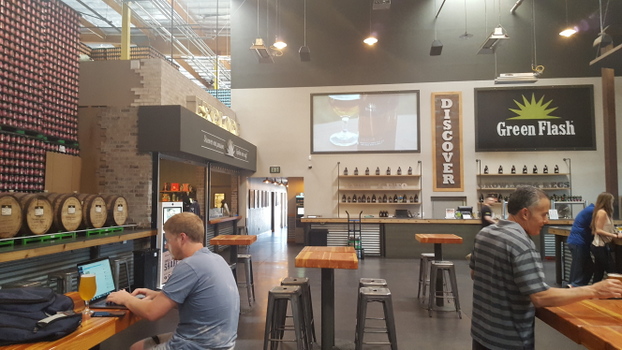
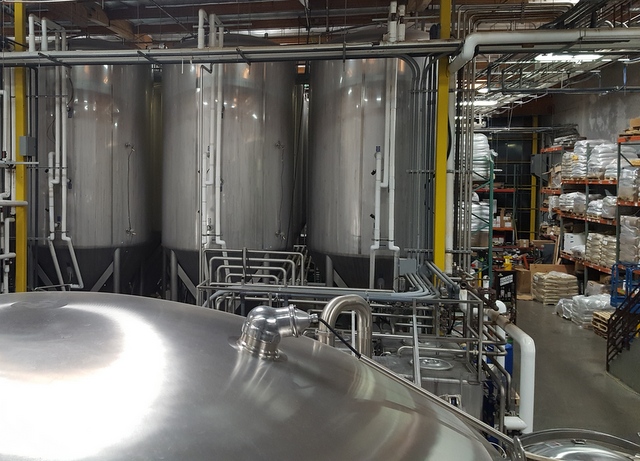
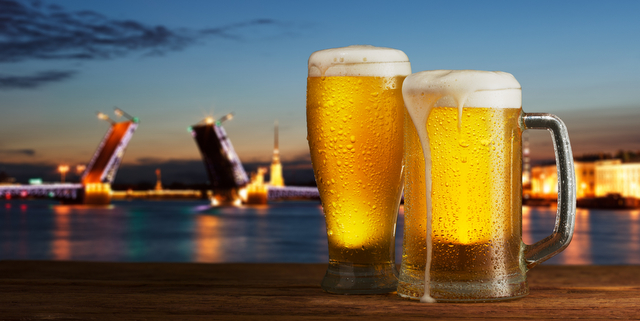



Leave a Reply
You must be logged in to post a comment.